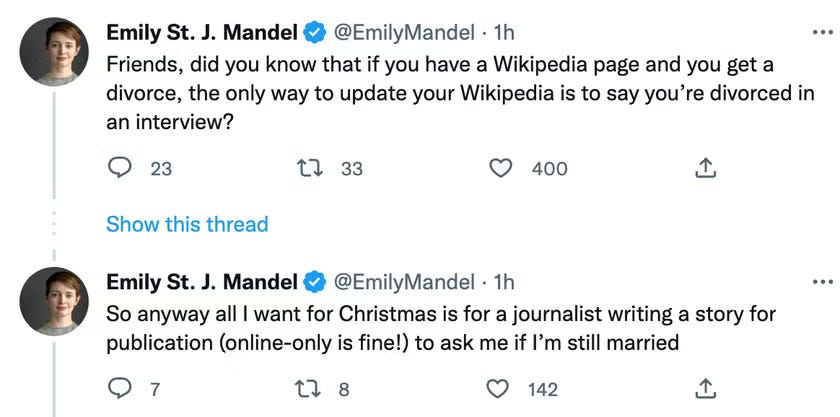Why did a Wikipedia editor give bad advice to Emily St. John Mandel?
She should not have needed to do an article with a publication simply to get her Wikipedia page updated.
There is something inconsequential that has bothered me for a few years. In 2022, the author Emily St. John Mandel (known for her book Station Eleven, among others) did the following tweets:
In response to this, the journalist Dan Kois at Slate honored this request and did a simple interview with her, which included this exchange:
There is, in fact, a specific reason we’re doing this interview, which is that you have been having trouble getting Wikipedia to recognize your divorce. Can you tell me about that Sisyphean trial?
A long time ago, I want to say 2012, I gave an interview to Publishers Weekly where I talked about my marriage. So there was this fairly major publication wherein I’d talked about being married, and it turned out that worked against me when trying to get Wikipedia to recognize my divorce. According to a Wikipedia editor, I needed a comparable citation to get the change made on the page.
The reason this bothers me so much is because a) yes, Emily St. John Mandel should not be expected to know how to get her Wikipedia updated, but b) the Wikipedia editor who gave her this advice was simply wrong.
In fact, it should have been as simple as her saying “I am divorced” in a social media post, including a tweet.
I realize why someone might think this not to be true, especially if you look at this section on the “Reliable sources” project page of Wikipedia:
Examples of unacceptable user-generated sources are Ancestry.com, Discogs, Facebook, Famous Birthdays, Fandom, Find a Grave, Goodreads, IMDb, Instagram, Know Your Meme, Reddit, Snapchat, TikTok, Tumblr, TV Tropes, Twitter, WhoSampled, and Wikipedia (self referencing).
However, the next sentence of that paragraph indicates that there are exceptions:
For official accounts from celebrities and organizations on social media, see the section about self-published sources below.
Emily St. John Mandel is a celebrity, if not a household name, and that means that whatever exception is made for celebrity social media posts should be taken into account. Let’s see what that section says:
Self-published or questionable sources may be used as sources of information about themselves, especially in articles about themselves…. These requirements also apply to pages from social networking websites such as Twitter, Tumblr, and Facebook. Use of self-sourced material should be de minimis; the great majority of any article must be drawn from independent sources.
This means that, yes, a celebrity posting on social media saying that they are divorced should absolutely be good enough for a citation on a Wikipedia article about said divorced person.
Which brings me back to the question in the headline: why did someone give her this bad advice?
I don’t know, but I hope readers of this brief article learn something from it and that my effort can help correct the bad advice given to Emily St. John Mandel about Wikipedia.
My final question: should I edit her Wikipedia page to include this bizarre moment? I ask because it was not limited to Slate: the BBC, Business Insider, Kirkus Reviews and various other publications picked up on Slate’s Wikipedia divorce article, meaning that this bad info about Wikipedia was spread out across the internet.
It might not be a big deal, but it bothers me. Which I suppose is how many good Wikipedia edits begin.



If I had to guess, I'd guess this happened because Wikipedia's policies are rarely followed simply and literally and it is in fact often difficult to get social media posts accepted as sources. Here, I would expect pushback on the two mutually-reinforcing grounds of (1) recency and (2) lack of notability. There are editors who believe Wikipedia should wait for secondary sources to include personal details before Wikipedia does because "the detail must not be notable or must be too recent if it is not yet covered by secondary sources." The consensus on how to apply official policy on any given page is generally set by a very small group of watchers of the page, and these small groups of watchers can interpret and prioritize the different policies very creatively and stubbornly.
how is an author not competent enough to update a wikipedia page. jfc